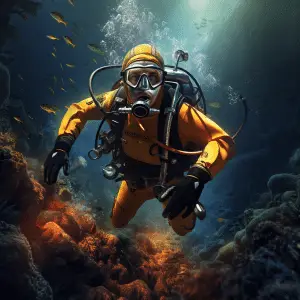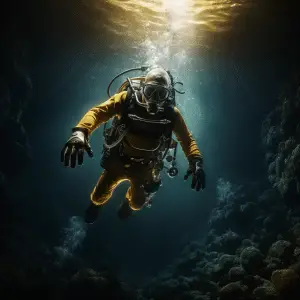Introduction to Scuba Diving Safety
Scuba diving is an exciting and unique way to explore the ocean’s depths. But, safety should always come first! You can make sure your dive is safe and enjoyable by following the right guidelines and precautions.
Proper training and certification from a trusted diving organization is key. Courses provide the necessary knowledge to handle tricky situations and how to use equipment properly.
Before entering the water, conduct a pre-dive check. Inspect regulators, air tanks, and dive computers for any malfunctions or leaks.
Being physically fit is also important for scuba divers. Exercise regularly and maintain a healthy lifestyle. This boosts lung capacity and reduces the risk of decompression sickness. Be aware of any medical conditions that may be a risk underwater.
Buddy diving is essential. Having a reliable dive buddy provides support in emergencies. Communication, assistance, and shared responsibility during dives are all important. Immediate help is available if needed.
Understanding the Importance of Proper Equipment Usage

Correctly using your scuba gear is key for safety during diving. It gives divers the trust to explore the underwater world. Each part has a certain role, like the mask for clear vision and the regulator for breathing. Knowing how to use these tools properly avoids possible risks and boosts the diving experience.
A necessary step is keeping the equipment in good shape. Regularly examining and servicing it makes sure it works correctly, avoiding malfunctions or breakdowns while diving. Divers should also learn the features and functions of their gear with thorough practice and instruction. This assists in using the tools properly underwater.
Selecting the right gear for the conditions is also important. For example, if the water is cold, thicker wetsuits or drysuits are needed to stay warm. Knowing the flexibility of various types of gear helps divers modify to different conditions for safer dives.
Backup or redundant systems can be lifesavers in case of equipment failure. Carrying extras such as spare parts or a dive computer provides assurance and stops unexpected problems from getting worse.
Pro Tip: Before diving, do pre-dive checks to make sure gear is functioning properly. This lowers the risk of issues at depth and increases safety when scuba diving. And if you can’t handle the pressure, just think of your ex’s phone ringing with potential dates!
Pre-Dive Safety Measures
Scuba diving is an exciting activity, allowing us to explore the underwater world. But, safety must come first! Here are some important safety steps before taking the plunge:
- Check your equipment. Ensure all your diving gear is in good condition and working correctly.
- Control your buoyancy. Make sure your BCD is balanced with weight and air, preventing sudden ascents or descents.
- Plan your dive. Learn about the dive site, including possible dangers and emergency procedures. Talk to your dive buddy or instructor.
Also, be sure you are fit and well-rested. Hydrate throughout the day to avoid dehydration underwater.
Always remember safety comes first when scuba diving. Don’t let the desire for amazing underwater sights override safety precautions.
So, get ready, check your stuff, stay in control, and plan your dives. Have a safe and wondrous underwater experience!
Dive Execution and Emergency Preparedness: Be prepared for any situation, for nothing is more rewarding than being safe in the deep blue sea!
Dive Execution and Emergency Preparedness
When scuba diving, it is essential to keep control of your breathing and follow depth limits and ascent rates.
To stress the importance of Dive Execution and Emergency Preparedness, let me tell you a story.
A fellow diver experienced equipment failure at great depth in the Great Barrier Reef.
Thanks to his proficiency in emergency procedures and communication with his buddy, he was able to signal for assistance quickly.
This shows the need to be prepared for unexpected circumstances while diving.
Dive Execution and Emergency Preparedness ensure safe diving experiences. With these practices, divers can explore the deep blue sea with confidence.
Be prepared, stay vigilant, and enjoy the wonders of the ocean!
Environmental Awareness and Conservation

Scuba diving is an exhilarating adventure and requires an understanding of the environment. To dive responsibly, we must be conscious of our impact on the underwater world. We must avoid touching or damaging coral reefs, as they are delicate ecosystems. Keeping a respectful distance from marine life is key to minimizing disturbance.
Good buoyancy control helps prevent accidental contact with the seabed. This enables us to move effortlessly, causing less disturbance. Using reef-safe sunscreen is important too – it protects us and marine life from harmful chemicals.
Conservation is not just about what we do while diving. We can also support sustainable tourism initiatives and local conservation organizations to fund research and conservation projects. Choosing eco-friendly dive operators is a great way to contribute to the preservation of underwater habitats.
Continuing Education and Certification
Continuing education and certifications are vital for staying up-to-date with the latest safety protocols and techniques. It also shows your proficiency in various aspects of scuba diving, such as rescue techniques, equipment handling, and emergency procedures. Plus, it serves as proof of your commitment to safe practices – essential for accessing certain dive sites and joining advanced dives.
Going beyond that, continuing education and certification provide a deeper understanding of the underwater environment. This helps divers recognize potential hazards and make informed decisions.
To keep up your active status, always remember to renew your certifications regularly and take part in continuing education programs. This way, your skills stay sharp and you’re ready for anything during your underwater adventures. After all, the only sharks you want to meet while scuba diving are the ones in the ocean!
Conclusion: Emphasizing the Vital Role of Scuba Diving Safety in Enjoying a Safe and Rewarding Experience
Scuba diving safety is crucial for an enjoyable experience. To reduce risks, one must:
- Be certified
- Use correct equipment
- Follow guidelines
Furthermore, good physical condition and being aware of limitations are essential. Inspecting gear and conducting pre-dive checks is wise. Interacting with marine life must be done with caution. Respect and understanding of the environment is key to preserving it for future generations. It is recommended to dive with a buddy system for effective communication and help if needed. Finally, DAN states that most accidents are due to human error, not equipment failure.
